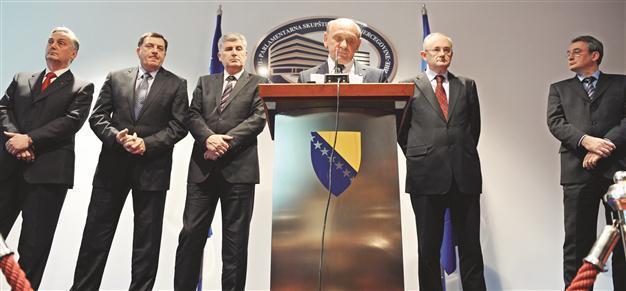Bosnia ends political deadlock
SARAJEVO

(L-R) Leaders of Bosnia and Herzegovina’s main parties Zlatko Lagumdzija, Milorad Dodik, Dragan Covic, Sulejman Tihic and Bozo Ljubic address journalists after they agree to form a government on Dec 28. AFP photo
Bosnia and Herzegovina’s main Muslim, Serb and Croat parties made a major breakthrough Dec. 28, agreeing to form a government and pass a budget for 2011 to avoid financial collapse, ending a political crisis that blocked further European Union integration.
“We have reached an agreement on the composition of the government,” Sulejman Tihic, leader of the Party of Democratic Action, said in a press conference. He said party leaders also agreed on two pieces of legislation, holding a census and distribution of state aid, which Brussels insists on if Bosnia is to take further steps toward joining the EU.
The agreement will allow the EU and the International Monetary Fund (IMF) to release hundreds of millions of dollars of frozen funds to the country. Observers said EU and other Western ambassadors pressed the parties to reach the agreements, partly out of fear that further economic hardship in the country could spark unrest.
Hard-line Bosnian Serb leader Milorad Dodik told reporters, “Nobody really got what he wanted, but it’s good that this has come to an end.” For 14 months, election winners had quarreled over who would run which ministry, but Dec. 28’s deal clears the way for the formation of a government as soon as January.
“None of us are totally happy, but it is a good agreement made in the interest of Bosnia, its communities and its citizens,” Tihic said.
“A lot of courage and determination were needed to broker this deal,” said Bosnian Croat leader Dragan Covic, whose party will take the prime minister’s post. “The agreement shows the level of confidence we have established among us. We believe this is the path to follow to try to stabilize the economic and political situation in Bosnia.”
After almost four hours of negotiations, the main parties in central Parliament representing the three communities agreed that the post of prime minister would be filled by a Bosnian Croat. Covic’s party had to submit the name of its candidate to the presidency yesterday. After being officially named prime minister designate, the candidate will still have to be approved by central Parliament, but the parties that concluded the deal have a majority there.
The remaining nine ministries in the government will be divided among the political parties of the three communities, with the foreign minister set to be from a Muslim party.
Dodik also praised the agreement as a victory for “compromise and understanding” after months of squabbling over the distribution of government posts. “After the implementation of the two laws [on the census and state aid] and the formation of the government, Bosnia can apply for candidate status for the European Union,” said Dodik, whose Alliance of Independent Social Democrats (SNSD) party has blocked EU-related laws in the national Parliament for more than a year.
Initially Sarajevo planned to apply for candidate status this month but is now expected to do so after the new government is inaugurated in early January. “Better days are ahead because we reached an agreement on the principles that will allow Bosnia to develop,” said Bozo Ljubic, leader of the second largest Bosnian Croat party.
The EU Special Representative to Bosnia Peter Sorensen welcomed the agreement, saying the EU was “encouraged to see that the spirit of compromise has prevailed after months of political deadlock.
“It is important that the BiH [Bosnia] political leaders were able to find a solution on the EU related matters... that are crucial for the next steps of BiH on the EU integration agenda,” Sorensen said in a statement.
